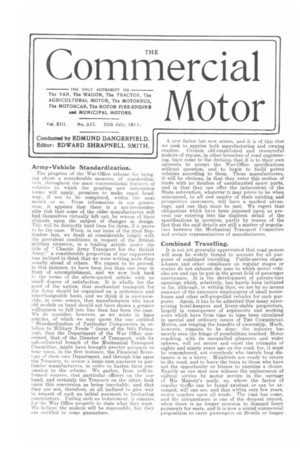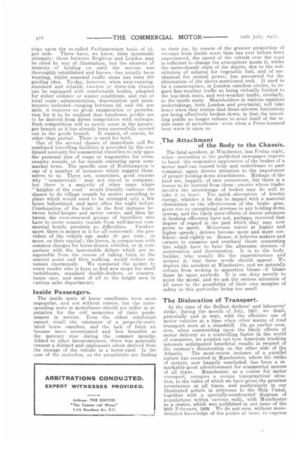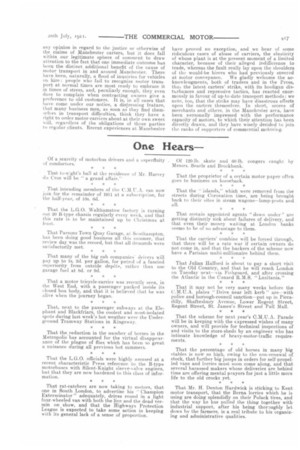Army-Vehicle Standardization.
Page 1

Page 2

Page 3

If you've noticed an error in this article please click here to report it so we can fix it.
The progress of the War-Office scheme for bringing about a considerable measure of standa rdiza1 ion, throughout, the main constructional feat tires of vehicles to which the pending new subvention terms will apply, promises to make rapid headway, if not to be completed, within the next month or so. From information in our possession, it appears that there is a not-inconsiderable risk that some of the older manufacturers will find themselves virtually left out, by reason of their attitude upon the subject of changes in design. This will be distinctly hard lines for them, if it prove to be the case. When, in our issue of the 22nd September last, we dealt at considerable length with the prevalent conditions in respect of the British military situation, in a leading article under the title of "Chaotic Army Transport for the British Army," a considerable proportion of .our supporters was inclined to think that we were writing more than usually ahead of others. We expect to be proved, in this instance, to have been less than one year in front of accomplishment, and we now look back to the terms of the above-quoted article with no small degree of satisfaction. It is wholly for the good of the nation, that mechanical transport for Ilie Army should be organized on a systematic and interchangeable basis, and we think it is unreasono hie., in some senses, that manufacturers who have old models on hand should not have shown a greater willingness to fall into line than has been the case. We do consider, however, as we wrote in later articles, of which we may quote the one entitled " Standardization of Particular Components in Telation to Military Needs " (issue of the Ieth February), that the Department of the War Office concerned, that of the Director of Transport, with its sub-collateral branch of the Mechanical Transport Committee, might have brought greater pressure to Hear noon, in the first instance, the Financial Secret 'try of their own Department, and through him upon the Treasury, to secure a lump-sum payment to particular manufacturers, in order to hasten their conversion to the scheme. We gather, from well-informed sources, that particular officers on the one hand, and certainly the Treasury on the other, look upon this conversion as being inevitable, and that they are not, therefore, at all inclined to give way in respect of such an initial payment to hesitating constructors. Failing such an indimement, it remaina for the War Office properly to statewhat they want. We believe the makers will be reasonable, but they are entitled to some guarantees.
A new factor has now arisen, and it is of this that we seek to apprise both manufacturing and owning readers. Certain old-established and resourceful makers of repute, in other branches of road engineering, have come to the decision that it is to their own interests to accept the War-Office specifications without question, and to begin to build petrol vehicles according to them. Those manufacturers, it will be obvious, in that they enter this section of trade with no incubus of unexhausted spare parts, and in that they can offer the inducement of the State subvention, whatever it may prove to be when announced, to all and sundry of their existing and prospective customers, will have a marked advantage, and one that must be met. We regret that obligations which have been imposed upon us prevent our entering into the slightest detail of the specifications in question, partly by reason of the fact that the said details are still a matter of negotiation between the Mechanical Transport Committee and certain representatives of manufacturers.
Combined Travelling.
It is not yet generally appreciated that road motors will soon be widely turned to account for alt purposes of combined travelling. Public-service charsa-bancs and other omnibuses on regular stages or routes do not exhaust the uses to which motor vehicles are and can be put in the great field of passenger conveyance. It is the development of private-hire openings which, relatively, has barely been initiated so far, although, in writing thus, we are by no means unaware of the extensive employment of small motorbuses and other self-propelled vehicles for such purposes. Again, it has to be admitted that many enterprising hotel-keepers and livery-stable proprietors, largely in consequence of arguments and working costs which have from time to time been circulated in special and ordinary issues of THE COMMERCIAL Moron, are reaping the benefits of ownership. Much, however, remains to be done : the industry has merely seen the fringe of possibilities touched. Motor coaching, with its unequalled pleasures and wider spheres, will yet revive and excel the triumphs of eighty and ninety years ago on the road, for, it must be remembered, not everybody who travels long distances is in a hurry. Hundreds are ready to return to the road, and to leave the train to those who have not the opportunity or leisure to exercise a choice. Exactly as one may now witness the replacement of railway service by motor service in the carriage
of is Majesty's mails, so, where the factor of regular traffic can be found existent or can be arranged, will one see, and that within very few years, motor coaches upon all roads. The time has come, and the circumstance is one of the deepest import, when there is no longer occasion to demand fancy payments for seats, and it is now a sound commercial proposition to carry passengers on 20-mile or longer trips upon the so-called Parliamentary basis of 1d. per mile_ There have, we know, been spasmodic attempts : those between Brighton and London may be cited by way of illustration, but the element of tenacity—of holding on until the service was thoroughly established and known—has usually been wanting, whilst seasonal traffic alone has been the guiding idea. To-day, however, when easy-running, standard and reliable two-ton or three-ton chassis can be equipped with comfortable bodies, adapted for either summer or winter conditions, and run at total costs—administration, depreciation and maintenance included—ranging between ad. and 10d. per mile, it requires no great examination or protestation for it to be realized that handsome profits are to be derived from direct competition with railways. Such competition will as surely occur in the passenger branch as it has already been successfully carried out in the goods branch. It cannot, of course, be other than partial. There is need for both.
One of the several classes of immediate call for combined travelling facilities is provided by the continued necessity for commercial travellers to rely upon the personal hire of traps or wagonettes for crosscountry rounds, or for rounds centering upon some market town. The specific case of Northampton is one of a number of instances which suggest themselves to us. There are, sometimes, good reasons why " commercials " may not travel in company, but there is a majority of other cases where "knights of the road " would literally embrace the chance to do village rounds by motor, according to plans which would need to be arranged only a few hours beforehand, and most often the night before. Combination of the kind, in the first instance between hotel-keeper and motor owner, and then between the ever-renewed groups of travellers who have to cover country rounds from well-known com mercial hotels, presents no difficulties. Furthermore, there is money in it, for all concerned : the providers of the vehicle can make 50 per cent.. or more, on their capital ; the hirers, in comparison with common charges for horse-drawn vehicles, or in comparison with the lamentable delays which are inseparable from the course of taking train to the nearest point and then walking, would reduce exnenses enormously. We commend the points to every reader who is keen to find new scope for small motorbuses, standard double-deckers, or countryhouse cars, and most of all to the bright men in various sales departments.
Inside Passengers.
The inside seats of horse omnibuses were most unpopular, and not without reason, but the corresponding seats in motorbuses should not suffer in re imitation for the evil memories of their predecessors in service. Even the oldest inhabitant cannot recall the existence of a properly-ventilated horse omnibus, and the lack of fresh air became more accentuated and less bearable as the mercury rose during the summer months. Added to other inconveniences, there was generally nresent a distinct and unpleasant odour derived from the storage of the vehicle in a horse-yard. In the case of the motorbus, as the proprietors are finding
to their joy, by reason of the greater proportion of revenue from inside scats than has ever before been experienced, the speed of the vehicle over the road is sufficient to change the atmosphere inside it, whilst the more-cleanly state of the depots, due to the substitution of mineral for vegetable fuel, and of mechanical for animal power, has accounted for the elimination of the above-mentioned reek. It used to be a commonplace, in London omnibus circles, to regard fine-weather traffic as being virtually limited to the top-deck seats, and wet-weather traffic, similarly, to the inside seats. Shareholders in various omnibus undertakings, both London and provincial, will take heart when they realize that these adverse limitations are being effectively broken down, in that the travelling public no longer refuses to avail itself of the inside seats of motorbuses—even when a Press-boomed heat wave is upon us.
The Attachment • of the Body to the Chassis.
The fatal accident, at Winchester, last Friday night, when—according to the published newspaper reports to hand— the responsive application of the brakes of a motor mail-van caused body and underframe to part company, again directs attention to the importance of proper holding-down attachments. Mishaps of the kind are, happily, of rare occurrence, but there is a lesson to be learned from them : owners whose trades involve the interchange of bodies may do well to take it to heart. The quick absorption of kinetic energy, whether it be due to impact with a material obstruction or the effectiveness of the brake gear, gives rise to exceptional stresses in any holding-down system, and the likely inter-effects of recent advances in braking efficiency have not, perhaps, received that degree of regard in the past which they may now prove to merit. Motorva.ns travel at higher and higher speeds ; drivers become more and more confident—and rightly so. Hence, it behoves makers and owners to examine and overhaul those connecting ties which have to bear the alternate stresses of acceleration and deceleration. It is to the bodybuilder, who usually fits the superstructure and secures it, that these words should appeal. We deplore the accident at Winchester, and we naturally refrain from seeking to apportion blame—if blame there be upon anybody. It is our duty merely to point the moral, and we ask the serious attention of all users to the possibility of their own margins of safety in this particular being too small.
The Dislocation of Transport.
At the time of the Belfast dockers' and labourers' strike, during the month of July, 1907, we dealt, pictorially and in text, with the effective use of motor vehicles at a time when other means of road transport were at a standstill. On an earlier occasion, when commenting upon the likely effects of motor delivery as a controlling factor in the world of commerce, we pointed out how American trucking interests anticipated beneficial results in respect of the carman's dictatorship on the other side of the Atlantic. The most-recent instance of a parallel nature has occurred in Manchester, where the strike of carters, now happily concluded, has been a remarkably-good advertisement for commercial motors
of all types. Manchester, as a centre for motor transport, occupies a unique topographical situation, to the value of which we have given the greatest prominence at all times, and particularly in our illustrated article in reference to the -Ship Canal, together with a specially-constructed diagram of populations within various radii, with Manchester as a centre, which was published in our issue of the 25th February, 1909. We do not care, without moredetailed knowledge of the points at issue, to express
any opinion in regard to the justice or otherwise of the claims of Manchester carters, but it does fall within our legitimate sphere of comment to draw attention to the fact that one immediate outcome has been the distinct additional benefit of the cause of motor transport in and around Manchester. There have been, naturally, a flood of inquiries for vehicles on hire : people who fail to recognize motor tram, port at normal times are most ready to embrace it in times of stress, and, peculiarly enough, they even dare to complain when contracting owners give a preference to old customers. It is, in all cases that have come under our notice, a distressing feature, that many business men, as soon as they find themselves in transport difficulties, think they have a right to order motor-carriers about at their own sweet will, regardless of the obligations of those parties to regular clients. Recent experiences at Manchester have proved no exception, and we hear of some ridiculous cases of abuse of carriers, the elasticity of whose plant is at the present moment of a limited character, because of their alleged indifference to. trade, whereas the fault really lay upon the shoulders. of the would-be hirers who had previously sneered at motor conveyance. We gladly welcome the acknowleogments, both of traders and in the Press, that the latest carters' strike, with its hooligan disturbances and repressive tactics, has reacted enormously in favour of up-to-date transport methods: we note, too, that the strike may have disastrous effects upon the carters themselves. In short, scores of merchants and others, in the Manchester area, have been personally impressed with the performance capacity of motors, to which their attention has been directly drawn, and they have wisely decided to join the ranks of supporters of commercial motoring.




















